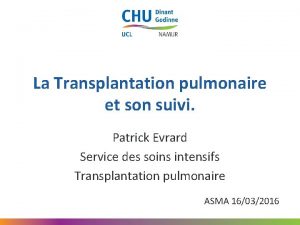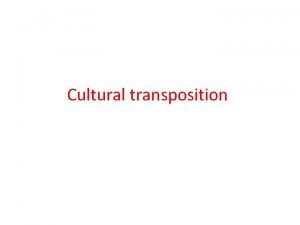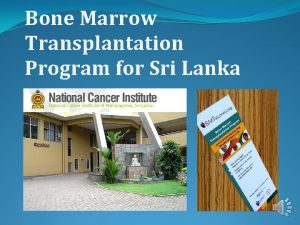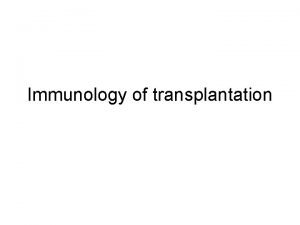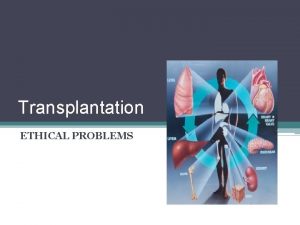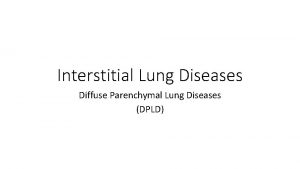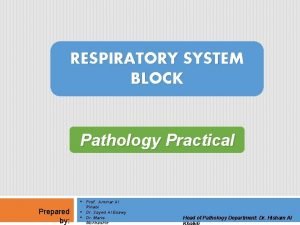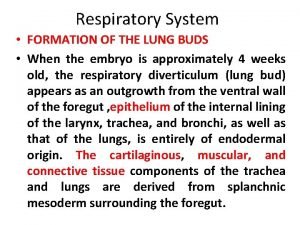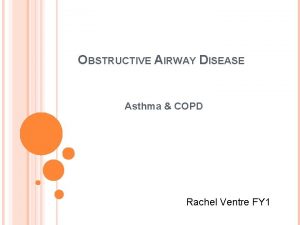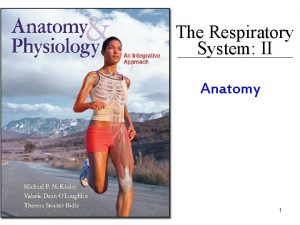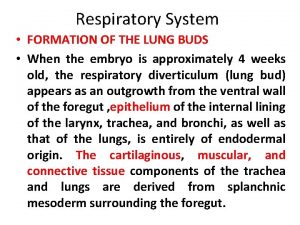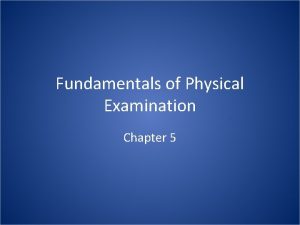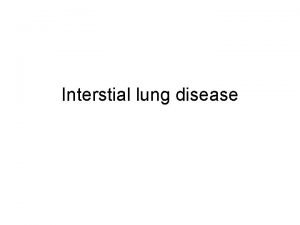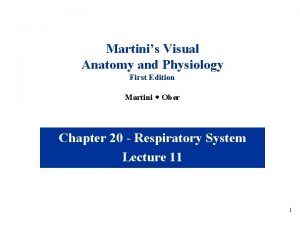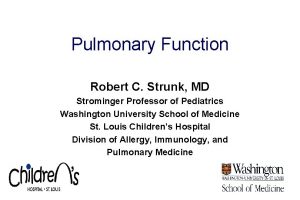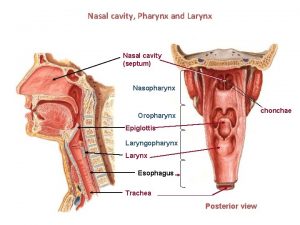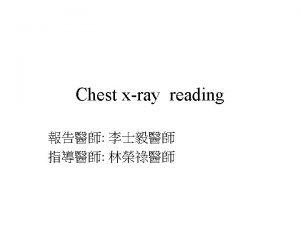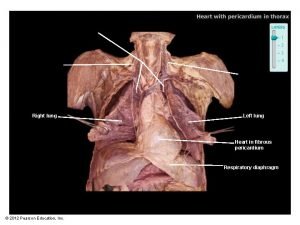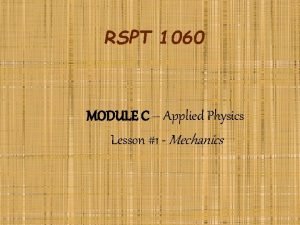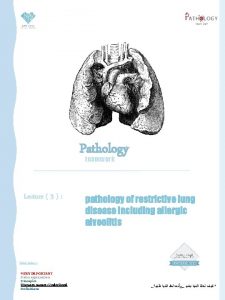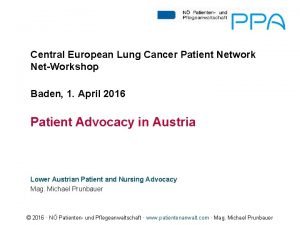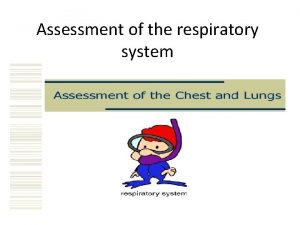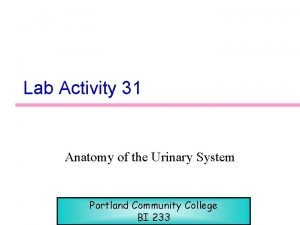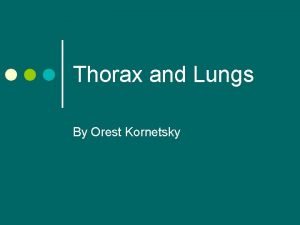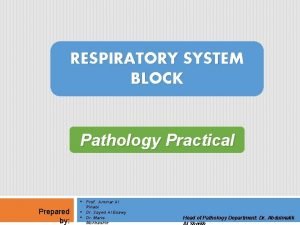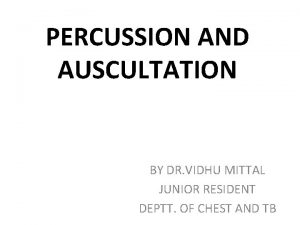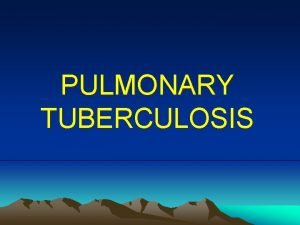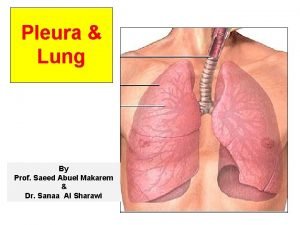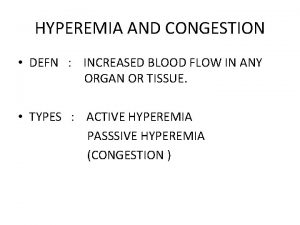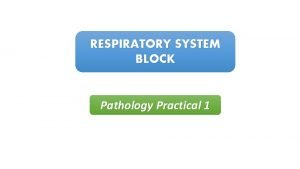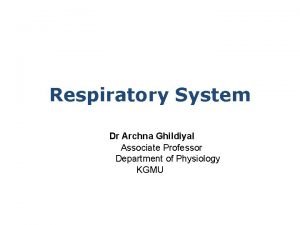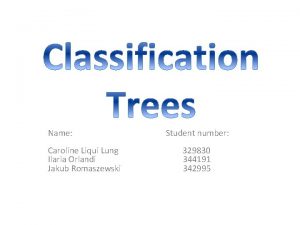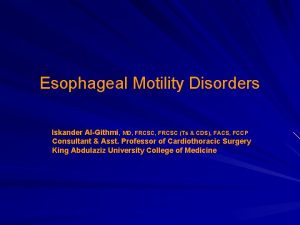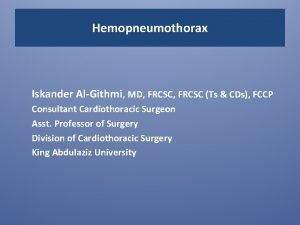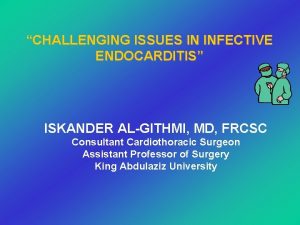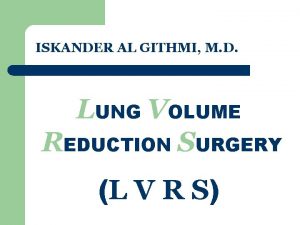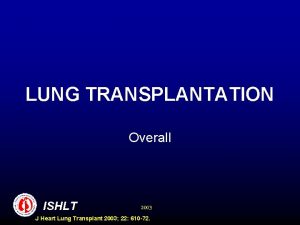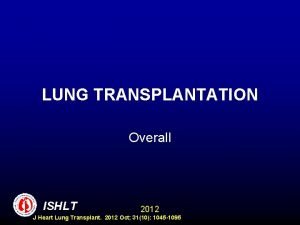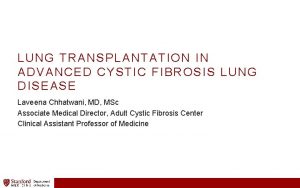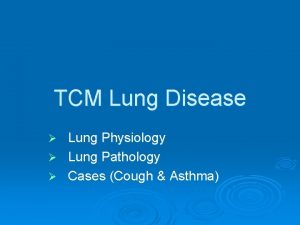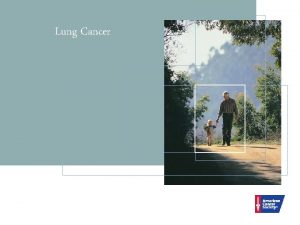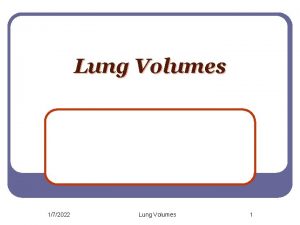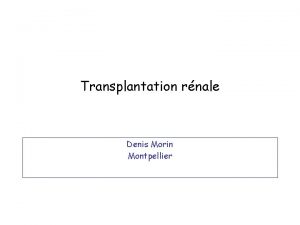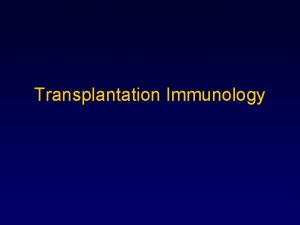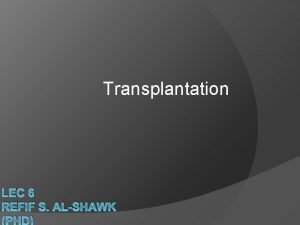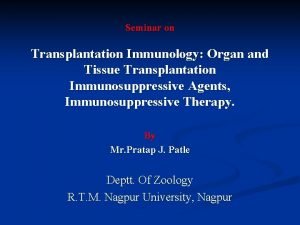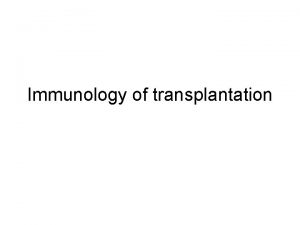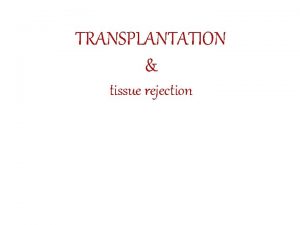LUNG TRANSPLANTATION ISKANDER ALGITHMI M D FRCSC Ts









































- Slides: 41

LUNG TRANSPLANTATION ISKANDER AL-GITHMI, M. D. , FRCSC (Ts & CDs), FCCP. Assistant Professor of Surgery Division of Cardiothoracic Surgery King Abdulaziz University

History: First human lung transplantation was performed by Dr. James Hardy in June 1963 at the University of Mississippi. Between 1963 & 1978, 38 lung transplant were done around the world. Two recipients live longer than one month. Lung and heart-lung transplantation were introduced into clinical practice in 1981 CSA era.

History (con’t. ) First successful transplantation in the world was done in 1983 at the University of Toronto. J. Cooper Over 15, 000 lung transplantation have now been performed worldwide. (ISHLT) statistics.

What Are Lung Transplantation For?

Indications: Obstructive air way disease (29%) - COPD - Alpha 1 antitrypsin deficiency Idiopathic pulmonary fibrosis (19%) Septic pulmonary disease (16%) - Bronchiectasis - cystic fibrosis Primary pulmonary hypertension (11%)

Other Varieties (11%) e. g. - sarcoidosis - lymphangioliomyomatosis (LAM) - eosinophilic granuloma

Who are not transplantable?

Contra-indications: Age > 65 years Active smoking Poor compliance with the treatment Severe active infections (HIV, Hepatitis B & C)

Con’t. Active malignancy within the past two years. Drugs or alcohol abuse. Dysfunction of major other organs - renal dysfunction - untreatable CAD or LV dysfunction - liver dysfunction

Recipient Selective Criteria: End-stage pulmonary disease with life expectancy < 2 yrs. Absence of severe extra pulmonary diseases. Strong motivation towards the idea of lung transplantation. Severe functional limitation, but potential for rehabilitation. Excellent psychosocial support.

Donor Selective Criteria: Age < 65 years No significant lung diseases Acceptable CXR Pa. O 2 > 300 mm Hg on F 102 1. 0 and PEEP 5 cm for 5 min. Bronchoscopy - clear

Con’t. Viral studies are negative (HIV and Hepatitis B & C) Donor – recipient size matching

Medical Conditions – Impact on eligibility for treatment Symptomatic osteoporosis Corticosteroid Nutritional issues Psychosocial issues Colonization of air ways with fungi or atypical mycobacteria

Guidelines for Timing Referral Chronic obstructive pulmonary disease and a 1 -antitrypsin deficiency amphysema Postbronchodilator FEV 1 < 25% predicted Resting hypoxia: Pa. O 2 < 55 to 60 mm Hg Hypercapnia Secondary pulmonary hypertension Clinical course rapid rate of decline of FEV 1 or life-threatening exacerbations Cystic fibrosis Postbronchodilator FEV 1 < 30% predicted Resting hypoxia: Pa. O 2 < 55 mm Hg Hypercapnia Clinical course: increasing frequency and severity of exacerbations Idiopathic pulmonary fibrosis VC, TLC < 60 -65% predicted Resting hypoxia Secondary pulmonary hypertension Clinical, radiographic, or physiologic progression on medical therapy Primary pulmonary hypertension New York Heart Association functional class III or IV Mean right atrial pressure > 10 mm Hg Mean pulmonary arterial pressure > 50 mm Hg Cardiac index < 2. 5 L/min/m 2

• Which transplantation procedure?


Living Donor Lobar Lung Transplantation (LDLT)

- The first living donor lung transplant was reported in 1990. Throughout the world there have been approximately 100 such procedure done to date. - The outcomes for recipients are similar to those who have received lungs from Cadaveric donors. - All living donor lung transplantation have been done utilizing a single lower lobe from each donor which account for about 25% of TLC for each.

Recipients Selection for LDLT - Similar as for cadaveric donors. - All candidates are first assessed and listed for cadaveric lung transplantation. - Potential recipient must be large enough to receive the lower lobe of an adult donor – at least the size of an average six year old (90 cm in height).

Selection of Potential Donors - Age 18 – 60 years - Blood group compatible with recipient - Of sufficient size - Have normal lungs by clinical, radiographic and physiological assessment.

Con’t. - No other significant medical illnesses - No history of hepatitis or HIV - Be willing to undergo complete psychological and psychiatric assessment. - Be willing to undergo complete physical assessment.

What Are the Benefits of LDLT?

- To reduce the number of patient dying while awaiting cadaveric transplantation. - Ability to schedule surgery on a non-urgent basis. - Ability to time transplantation before the recipient becomes too ill.

Con’t. - Shorter ischemic times. - Avoidance of hemodynamic instability associated with cadaveric donor. maintenance of

Operative goals: The operation should provide the highest degree of operative safety and the greatest cardio pulmonary rehabilitation.

Is the lung transplantation safe?

Complications: Early graft dysfunction – is an acute lung injury that is related to preservation and ischemia reperfusion. - referred to a clinical scenario as pulmonary infiltrate and poor oxygenation. - main consideration are rejection and infection.

Con’t. Airway complications: - Dehiscence - Stenosis - Bronchomalacia

Con’t. Rejection - is the single most important limitation to long-term survival. - Acute rejection * incidence – high * infrequently fatal * the principal risk factor for chronic rejection

Why might the lung be prone to rejection?

Con’t. - The lung has an extensive vasculature and circulating immune system. - The lung is constantly exposed to extrinsic infectious agents.

Con’t. Infection - is the leading cause of early and late morbidity and mortality. - wide spectrum of pathogens. - bacterial pneumonia and CMV pneumonitis have been the most problematic.

Why is the lung allograft so prone to infection?

Con’t. - The lung allograft is denervated – cough reflex is depressed. - Mucociliary clearance is depressed. - Lymphatic drainage is disrupted. - Immunisystems are suppressed by anti rejection medications.

Con’t. Lymphoproliferative Disease (PTLD) - the prevalence is 6% - most cases developed in the first year - the risk has been marked by increased in recipient who have had EBV-sero negative before transplantation and have acquired a primary EBV infection afterwards.

Con’t. Outcomes - gauged by survival - quality of life - cost-effectiveness


Con’t. Quality of life - the usual way of measuring the quality of life for lung transplantation is the improvement of pulmonary function test.


Con’t. Cost and Cost-effectiveness Analysis conducted at the University of Washington Medical Center - mean charge was $164, 989 - the average charges to post-transplantation care were $16, 628 per month during first 6 months and $5, 440 per month during the 2 nd month. - Lifetime cost was projected to be $424, 853

Con’t. Conclusion: - lung transplantation has expanded rapidly in the last decade. - chronic allograft rejection is a major impediment to long term survival. - progress in immunobiology will likely determine the state of the art.
 Stem cell phuket
Stem cell phuket Patrick evrard transplantation
Patrick evrard transplantation Cultural transposition
Cultural transposition Bone marrow transplantation sri lanka
Bone marrow transplantation sri lanka How does a kidney transplant work
How does a kidney transplant work Law of transplantation
Law of transplantation Dpld
Dpld Copd medical abbreviation
Copd medical abbreviation Lung buds
Lung buds Hypertranslucent lung meaning
Hypertranslucent lung meaning Horizontal
Horizontal Alveoli diagram
Alveoli diagram Lung bud formation
Lung bud formation Lung surface anatomy
Lung surface anatomy Sumptoms of blood clot in lung
Sumptoms of blood clot in lung Breathstacking
Breathstacking Tactile fremitus
Tactile fremitus Superimposition definition
Superimposition definition Vocal cord
Vocal cord Lung fishes
Lung fishes Difference between obstructive and restrictive lung disease
Difference between obstructive and restrictive lung disease Ct lung segments
Ct lung segments Umich
Umich Azygoesophageal line
Azygoesophageal line The pulmonary semilunar valve
The pulmonary semilunar valve Static compliance formula
Static compliance formula Restrictive lung disease
Restrictive lung disease Gesundheit central european lung cancer patient network
Gesundheit central european lung cancer patient network Chest assessment
Chest assessment Lung tissue
Lung tissue The double layered protective membrane of the lungs
The double layered protective membrane of the lungs Asbestos bodies
Asbestos bodies What is tactile fremitus
What is tactile fremitus Lung anatomy
Lung anatomy Optimal lung cancer pathway
Optimal lung cancer pathway Percussion tympanic
Percussion tympanic Pulmonary tuberculosis
Pulmonary tuberculosis Root of left lung
Root of left lung Hyperemia
Hyperemia Pathology
Pathology 3 types of lung receptors
3 types of lung receptors Caroline liqui lung
Caroline liqui lung

